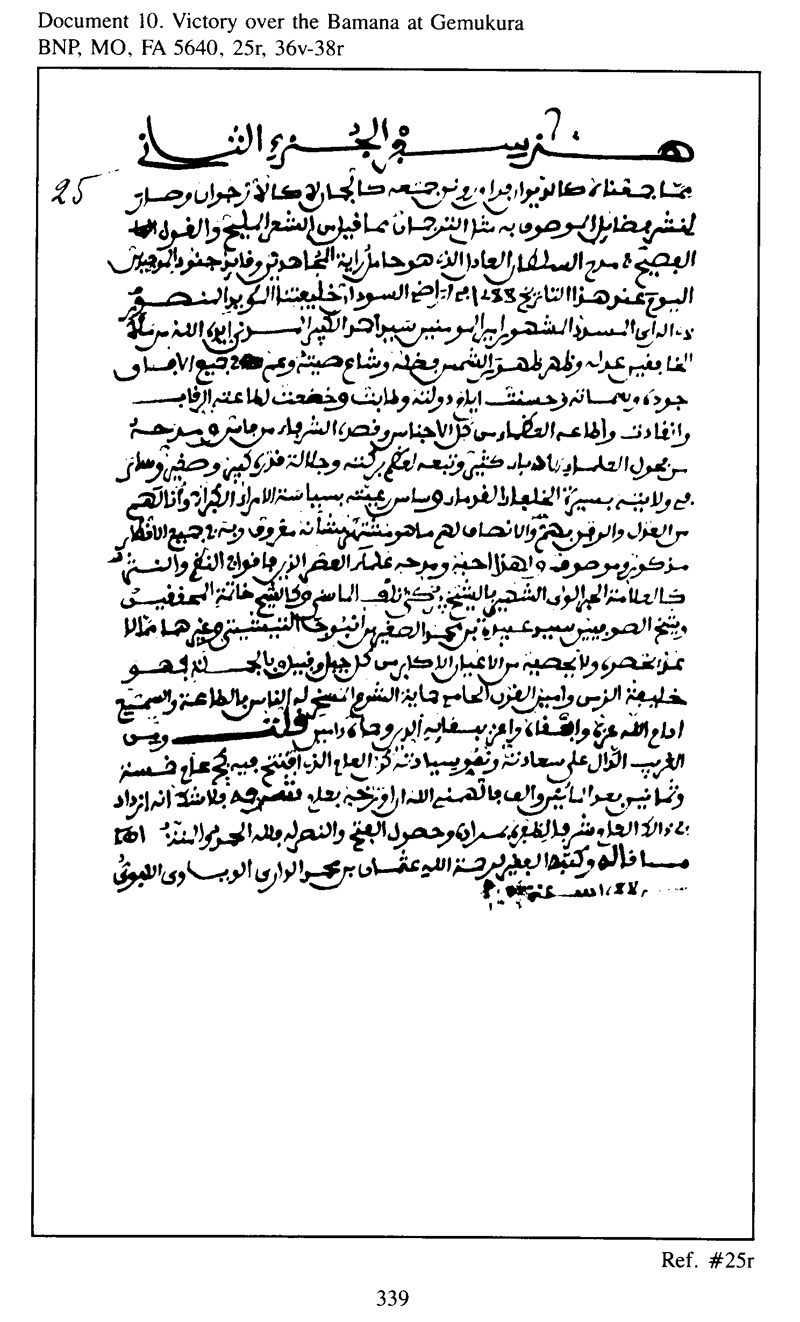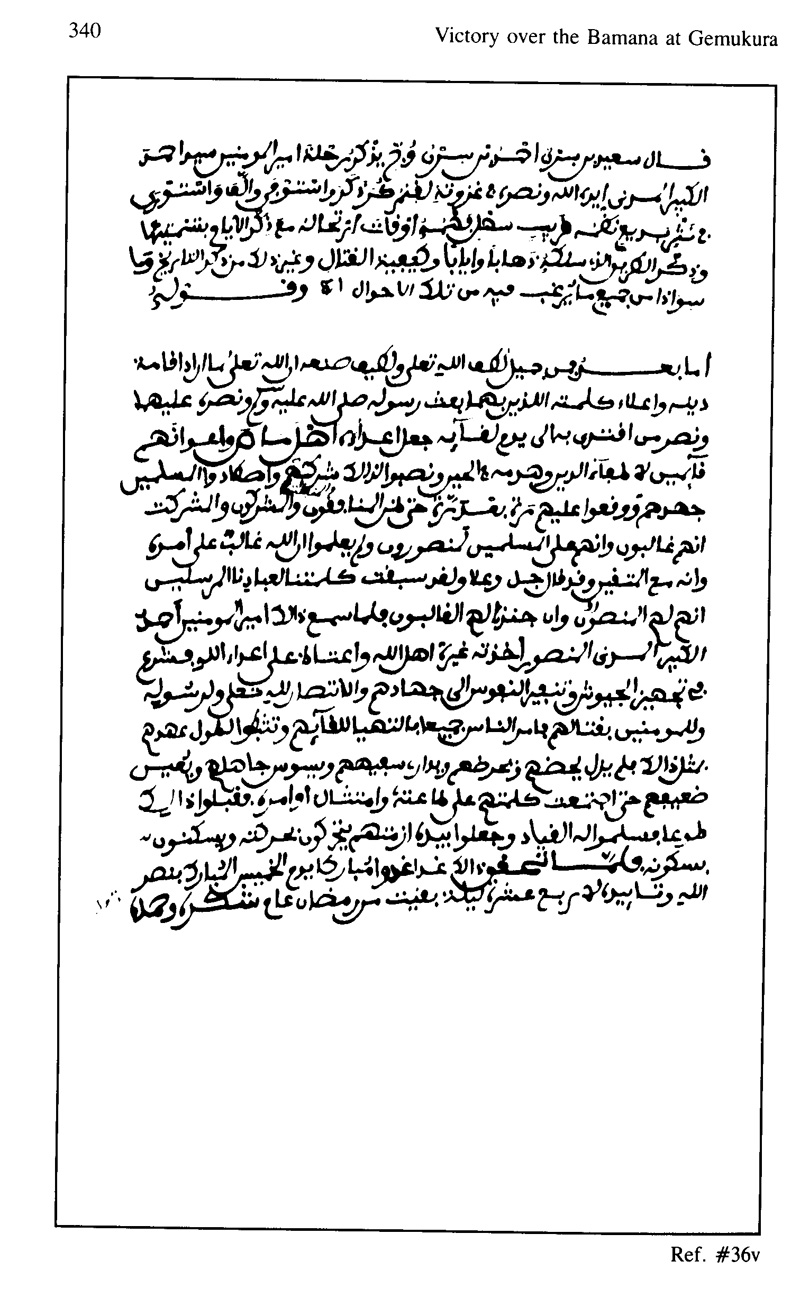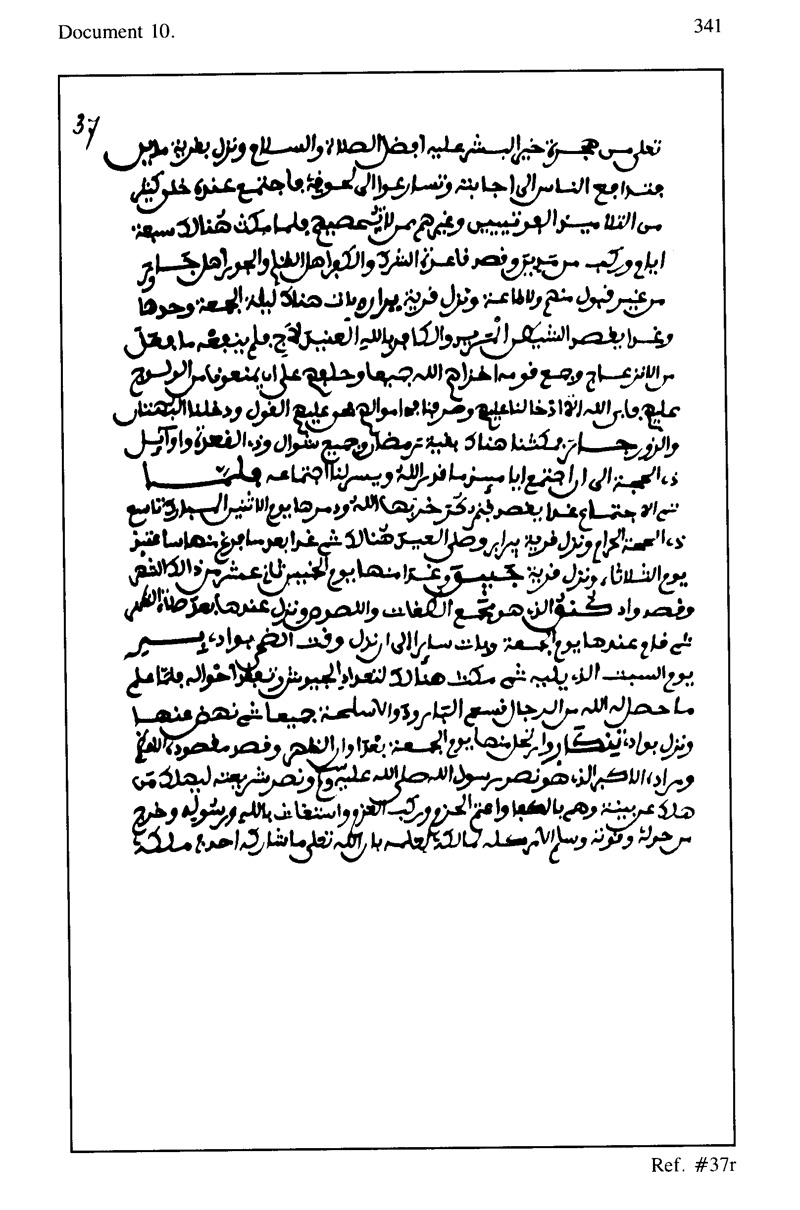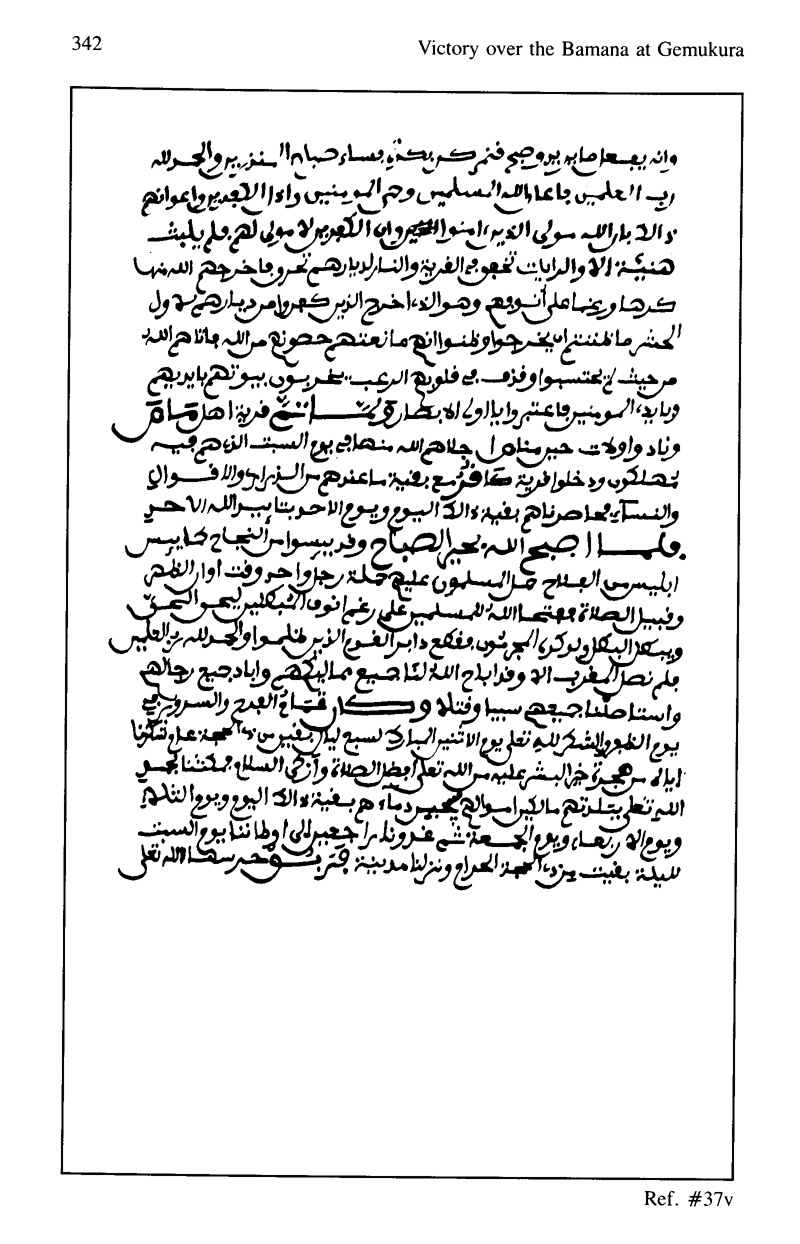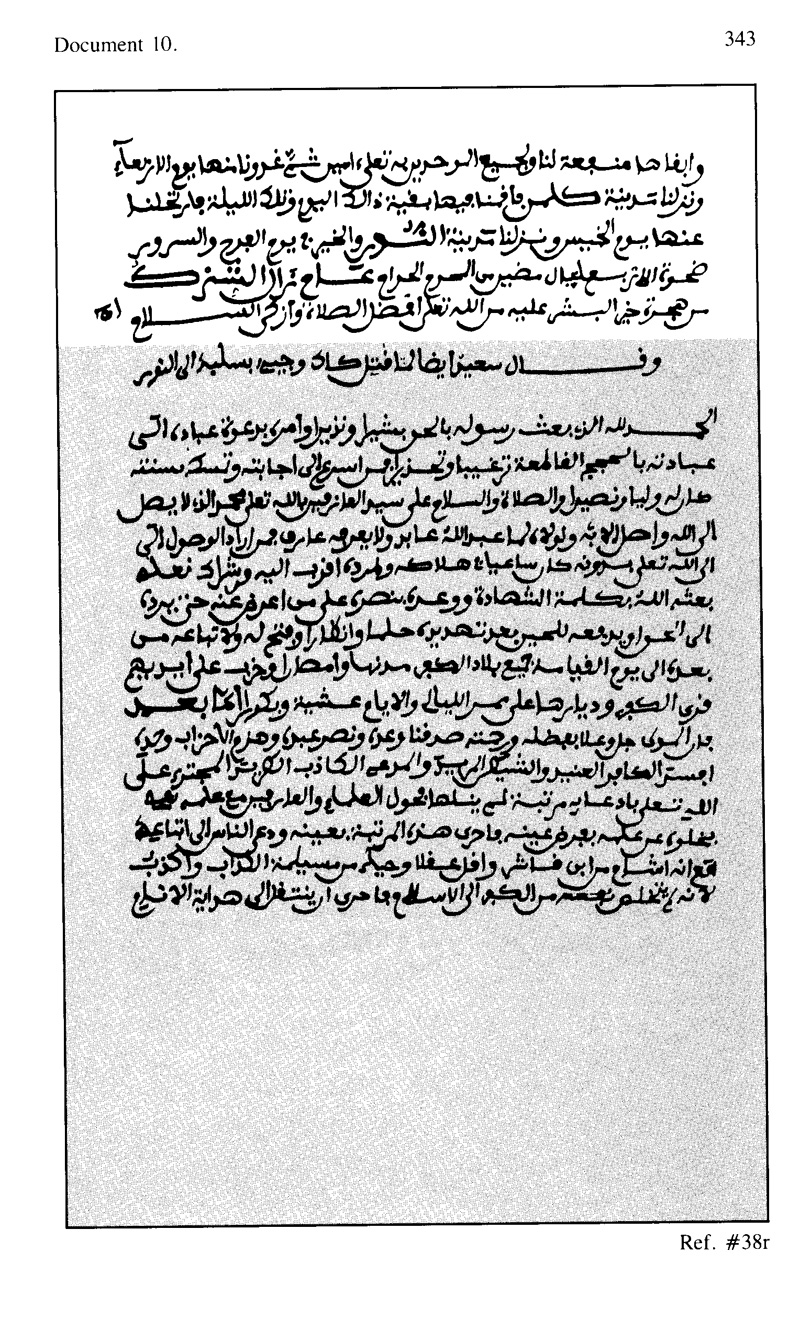Failed Islamic States in Senegambia
David Robinson
Victory over the Bambara at Gemukura

Transcript: Download (471 KB)
Translation:
Open/Close
[25r] This is the book of the second volume of what we have assembled as a corpus whose splendor excels, like pearls but not like purple.
And this was done in order to make known the characteristic virtues of the one described here, similar to a translation of what was said in beautiful poetry and eloquent speech, in praise of the just sultan who bears the banner of the mujahidun and is the leader of the contingents of those who believe in one God. Today is the year 1288 [AH] in the lands of the Sudan. Our khalifa is the one who is supported, the one made victorious, the possessor of sound judgment, the famous one, the Commander of the Faithful, Sidi Ahmad al-Kabir al-Madani. May God aid him, whose justice filled the east and the west, whose excellence appeared like the appearance of the sun. His good reputation and [the news of his] generosity and lofty status spread to all corners of the earth. The days of his rule are pleasant and delightful, and men are submissive and obedient to him. Great men of all races recognize his authority, sharifs come from Fez to see him, many of the leading scholars praise him. Great and small follow him because of his great blessing and the loftiness of his power. In his rule he followed the pattern of the early khalifas and governed his subjects in the manner of the great commanders. He dealt with them in justice, kindness and equity for which he is well known in all regions and by which qualities he is mentioned and described. It is because of this that he is loved and praised by scholars of the age who excel in both prose and verse, such as the great learned scholar and saint known as Shaykh Yirkoy Talfi of Masina, and the shaykh, the seal of inquiring scholars and shaykh of the Sufis, Sidi 'Ubayda ibn Muhammad al-Saghir ibn Anbuj of Tishit," and other elders and notables who cannot be counted from every generation and group.
In sum, he is the khalifa of the time, the commander of the century, the protector of the revealed law, the one to whom people submit, who obey him and listen to him accordingly. May God prolong his might to give him long life and through his continued existence may He strengthen religion and protect it. Amen.
And I said, among the amazing signs which indicate his good fortune and the growth of his leadership was the fact that the year in which he conquered Kejje was the year 1285 [AH], which God inspired me to call "his distinction." There is no doubt that his nobility increased in that year because of his obtaining what he aimed at -- the honor of triumph -- and obtaining conquest and victory. To God be grateful praise. The one who said and wrotethis is the one needing the mercy of God, 'Uthman ibn Muhammad al-Dari al-Wiyawi of Labe, in the year 1288 [AH].
[36v] Said ibn Cerno Ahmad ibn Cerno Wocce said [this] in recounting the journey of the Commander of the Faithful Ahmad al-Kabir al-Madani (may God support him and give him victory) to do battle against Gemukura. He gave a most complete account and wrote revealingly in prose whose weaving was elegant and the understanding of which was simple and easy. He mentioned the dates of his traveling and the battles with their names as well as the path which he traveled, both going and returning, a description of the fighting and other matters, such as mentioning the dates and whatever else might be desired, about those events. These are his words.
Henceforth, among the beautiful things of the kindness and the gentleness of the creation of God Most High is that God, when He wanted to establish His religion and raise aloft His word, sent His Messenger (may God's blessing be upon Him). He gave him victory over them. He gives victory to whomever follows His example until the day of encountering Him. God's enemies, the Massassi and their allies, revolted in order to extinguish religion and destroy it at that time. They established their polytheism. They hunted down Muslims as hard as they could and attacked them time after time until the hypocrites and polytheists, both men and women, believed that they had been victorious over the Muslims and defeated them. They did not know that God was the Master of His affairs and that He is always with those who fear him, for as God said: "And certainly Our word has already gone forth to Our servants, that they will indeed be helped and that Our troops will definitely be the victors."'
And when the Commander of the Faithful Ahmad al-Kabir al-Madani al-Mansar heard about that [the revolt of the Bamana], the fervor of the people of God welled up in him along with the fury against the enemies of God. Thereupon he began to prepare the armies and to dispatch them to make jihad against them and to gain victory for God Most High and His Messenger and the believers by fighting them. He ordered all of the people to prepare themselves to encounter them. But they held back because it had been a long time since they had fought He did not cease to spur them on, to prod them, to plead with the weak-willed and drive on the ignorant and give help to the weak until they were all united in obedience to him and obeyed his commands.
They agreed to that voluntarily and handed the leadership over to him and put the reins in his hands, moving when he moved and remaining still when he was still." When that was established he enjoyed a blessed day with God's support and victory, on a Thursday, with 14 nights remaining in Ramadan in the year "thanks and praise be to Him" [37r] of the hijra of the best human being (may the best prayers and peace be upon him).
Then he [Ahmad al-Kabir] reached the town of Madina. The people followed and rushed to join him. And there assembled a great many people, among them the disciples of Futa33 and others too numerous to count. After staying there seven days he rode from Madina and made for the center of polytheism and unbelief and of the people of oppression and injustice, that is the people of Diawara who had not accepted him or given their obedience. He stayed at the town of Yerere35 and spent only Friday night there. The next day he went after the refractory devil, the stubborn disbeliever in God, whose harassment availed him nothing. He gathered all his forces (may God disgrace him) and made them swear to prevent us from entering among them, but God insisted we should enter among them and have access to their property. Thus did the word [of God] prove true against them and we entered [the town of] lying and falsehood, Diara.
We stayed there for the remainder of Ramadan, all of Shawwal and Dhu'l-Qa'da and the early days of Dhu'l-Hijja, until there assembled at that time what God had decreed and made easy for us to assemble. The day after the assembling was finished he went on the attack against Gemukura. God destroyed it and laid it waste on a blessed Monday, the ninth of the sacred [month of] Dhu'l-Hijja.
They stayed in the village of Yerere to celebrate the Feast there. Then the next day, after he had finished celebrating on Tuesday, he went and stayed at the village of Diabige. The day after, Thursday, was the 12th of that month. They went to Wadi Konko, a place where renegades come and thieves congregate. He arrived there after the midday prayer. He stayed on Friday and spent the night traveling until the forenoon, arriving at Wadi Biri on Saturday, the next day. He stayed there in order to count his forces and examine the situation. Then, when he knew what God had provided him in the way of men he distributed all the powder and weapons; then he moved resolutely from there and encamped at Wadi Tinkare. He journeyed from there Friday after noon.
He made for his major goal and highest aim, which was the victory of the Messenger of God (peace be upon him) and the victory of the shari'a in order to destroy what had to be destroyed, by way of proof. He launched himself against the unbelievers, firm in his resolution and imbued with determination.
He asked for the help of God and His Messenger and he went out depending on His strength and might. He submitted his fate to his Master since he knew that no one shares with God in His dominion [37v] and that He does whatsoever He wills. He came to Gemukura in the early morning. How terrible a morning it was for those warned by God. Praise be to God, Lord of the worlds. God assisted the Muslims and protected the faithful and humbled the infidels and their allies. For God is the Lord of those who believe, while for the infidels there is no lord.
For it did not take long until flags were fluttering in the village and their houses were burning. God drove them out of it despite their unwillingness and aversion. [As God said]: He it is Who caused those who disbelieved of the people of the book to go forth from their homes at the first banishment. You deemed not that they would go forth, while they thought that their fortresses would defend them against God. But God came to them from a place they expected not and cast terror into their hearts -- they demolished their houses with their own hands and the hands of the believers. So take a lesson, 0 you who have eyes!" When the town of the Massassi was finished and they were calling out to their absconding friends, then God drove them out of there on that Saturday, when they perished.
They entered the village of Kagoro together with the remainder of those who were with them, including children, chiefs" and women. Then we besieged the remainder of them that day, and Sunday, with the aid of the One God. When God brought the finest of the mornings, and they despaired of escape and Iblis despaired of success, then the Muslims attacked them as one man, at about midday, just before the prayer. God gave the victory to the Muslims in order that truth might triumph and falsehood be brought to nought, though the evil doers were averse. The people who do evil were eradicated -- praise be to God, the Lord of the worlds.
By the time we performed the sunset prayer God had allowed us [to seize] all of their slaves and had destroyed all of their men. We uprooted them all by enslaving or killing [them]. There was great joy and delight on the day of victory -- thanks be to God Most High -- on the blessed Monday when seven nights remained in Dhu'l-Hijja in the year "we give Him thanks" of the hijra of the best of mankind (upon Him from God the Most High be the finest of prayers and purest peace).
Then we stayed -- praise be to God the Most High -- in their town taking possession of their goods and the injured prisoners during the rest of that day and Tuesday, Wednesday and Friday. Then the next day we traveled, returning to our lands on Saturday, the last night of the sacred [month of] Dhu'l-Hijja.
We stayed in the town of Farabugu -- may God the Most High protect it [38r] and preserve its utility for us and to all those who proclaim the unity of Him, who is exalted. Amen.
On the morning of Wednesday we went from there and camped in the town of Kolomina. We stayed there the rest of that day and night, then we traveled from there on Thursday and came to the city of light and excellence on a day of joy and delight, in the morning of Wednesday, after the 4th night of the sacred [month of] Muharram, in the year "polytheism disappeared" of the hijra of the best of mankind (upon Him from God Most High be the most excellent of prayers and the purest peace).
Translation: Download (357 KB)
Object PDF: Download (2346 KB)
Courtesy of David Robinson
Related Essay
The Reign Of Ahmad Al-KabirCreator: Ture, Seydu Jeliya
Contributing Institutions: David Robinson; MATRIX: The Center for Humane Arts, Letters, and Social Sciences Online at Michigan State University
Description: A description of Ahmad al-Kabir's campaign against the Bambara revolt, culminating in the victory of Gemukura in 1872, written by Ahmad's counselor Seydu Jeliya Ture. The document was probably written during the campaign, and not in Segu.
Date: 1872
Date Range: 1870-1879
Location: Segu or western Mali, Mali
Format: Text/jpeg
Language: Arabic
Rights Management: For educational use only.
Digitizer: MATRIX
Source: From the Umarian library, now housed at the Bibliotheque Nationale of Paris. BNP (Bibliotheque Nationale de Paris), MO (Manuscrits Orientaux), FA (Fonds Arabe), vol 5640, ff. 36-38. A copy of the Arabic text and the English translation can be found in John Hanson and David Robinson, eds. and trans., After the Jihad: the Reign of Ahmad al-Kabir in the Western Sudan. Michigan State University Press, 1991. Pages 143-52, 339-43.
